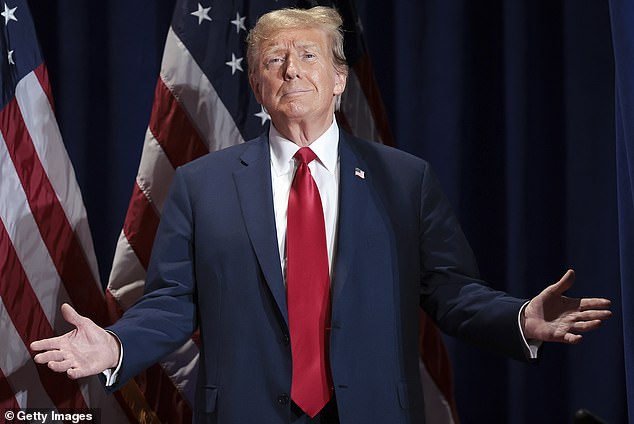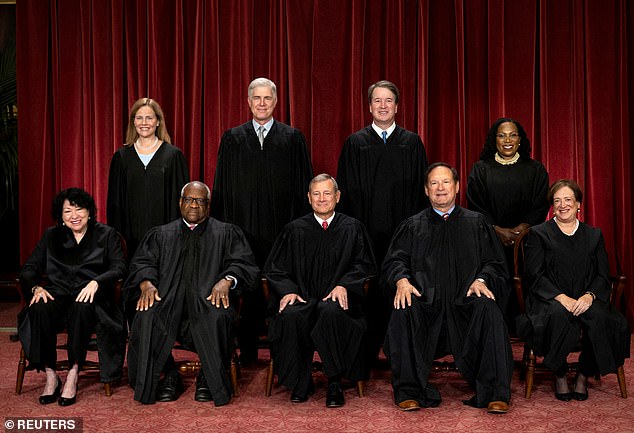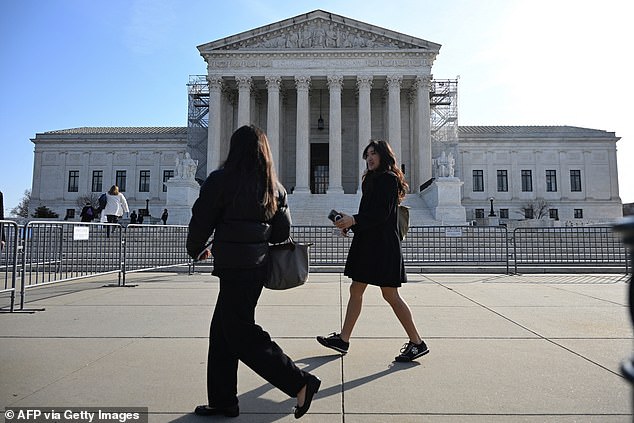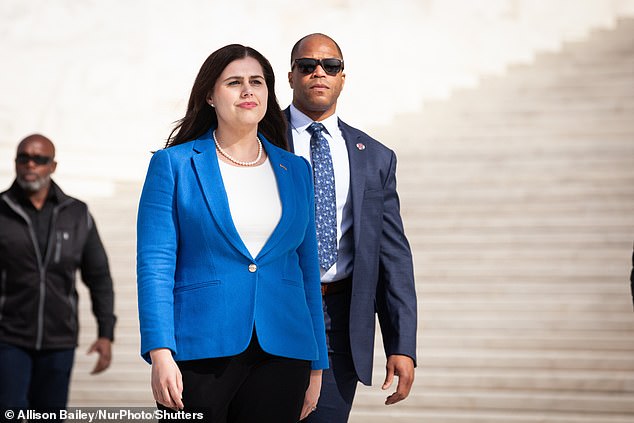- The decision is a fatal blow for states trying to remove Trump from the polls in 2024
- They argue that he should be disqualified from office for inciting an ‘insurrection’
- Trump’s name will now appear on Tuesday’s Colorado primary ballot
<!–
<!–
<!– <!–
<!–
<!–
<!–
The Supreme Court unanimously ruled Monday that Donald Trump can remain on the ballot, in a fatal blow to states trying to oust him and just 24 hours before 15 states vote on Super Tuesday.
The conservative majority court’s 9-0 decision in the high-stakes case means the Republican front-runner’s name will appear on Colorado primary ballots on Tuesday.
It also effectively ends efforts in other states to disqualify him from running in the 2024 general election over allegations that his conduct on Jan. 6 prevents him from holding office.
The former president, 77, has overcome one of the obstacles of his campaign before his probable rematch with President Joe Biden in the November general election.
The justices overturned Colorado’s ruling that kicked him off the ballot and said only Congress can decide if he is ineligible to run.
“States cannot unilaterally disqualify Donald Trump from the elections,” the ruling reads in a clear message to the campaign trying to overthrow him.

The Supreme Court ruled Monday that Donald Trump can remain on the ballot, in a fatal blow to states trying to oust him and just 24 hours before 15 states vote for Super Tuesday.
Trump has dominated the Republican primaries so far, and his latest rival, Nikki Haley, only won one race in Washington DC on Sunday night, with just over 2,000 voters participating.
As Haley celebrated the victory, the Supreme Court issued a surprising update saying the opinions would be released Monday, just 24 hours before Colorado heads to the polls in the Republican primary.
Trump was initially removed from the polls in Colorado, Maine and Illinois for violating the ‘insurrection’ clause of Section 3 of the 14th Amendment to the Constitution.
The decisions were based on the argument that Trump should be barred from holding federal office because he “engaged in an insurrection or rebellion” on January 6, 2021.
Trump then challenged the Colorado Supreme Court ruling, leading to Monday’s decision.
In an ironic twist, Trump likely would have faced the start of his first criminal trial on Monday in the Jan. 6 federal case had he not argued that he is immune from prosecution.
That case is also being considered by the Supreme Court and will have huge ramifications on the timeline of his criminal cases and whether he will be able to face trial for certain crimes.
He claims that he cannot be prosecuted because
Colorado will hold its presidential primary election on Tuesday, March 5.
Voting in the state of Colorado began in February, when 831,705 voters have already cast their votes. OKg to the Secretary of State. Trump’s name remained on the ballot.
The Supreme Court’s decision effectively ends a legal effort by left-wing activists to remove Trump from the ballot in some states, with the goal of preventing him from running a successful presidential campaign in 2024.
The lawsuit in Colorado was filed by Citizens for Responsibility and Ethics in Washington (CREW).


The ruling by the conservative majority court means that the name of the Republican favorite will appear on the ballots in the Colorado primary.


Court justices expressed skepticism during oral arguments in February that Trump could be prevented from approving the constitution.


Colorado Secretary of State Jena Griswold urged the Supreme Court to keep Trump off the ballot so that “votes are not wasted on ineligible candidates.”
The cases cite Section 3 of the 14th Amendment enacted after the Civil War to prevent former Confederates from holding federal office.
They argued that Trump was guilty of insurrection for his role in provoking the Jan. 6 riot at the Capitol protesting the certification of the 2020 presidential election.
Colorado Secretary of State Jena Griswold has persistently urged America’s highest court to keep Trump out of the polls.
In a brief filed with the Supreme Court in January, he called the presidential candidate an “ineligible insurrectionist.”
He added that it was his duty to protect the “maximum enfranchisement” of Coloradans’ voting rights.
His responsibility, he added, was to ensure that “votes are not wasted on ineligible candidates.”
Supreme Court justices expressed skepticism during oral arguments in February that Trump could be prevented from approving the constitution.
They argued that states had the legal ability to enforce Section 3, citing the danger that a state could decide who could be the president of the United States.
Three of the justices (Neil Gorsuch, Brett Kavanaugh and Amy Coney Barrett) were nominated by Trump.
